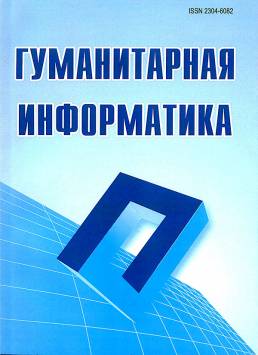INTERDISCIPLINARY MASTER PROGRAM DIGITAL HUMANITIES: RESULTS OF THE FIRST YEAR OF IMPLEMENTATION OF MANAGEMENT AND EDUCATIONAL EXPERIMENT
The inevitable growth of technology evolving as the result of the fourth industrial revolution does not only require the pace of social development and the factors and78Междисциплинарная магистратура Digital Humanitiesconsequences of digitalization to be studied closely; it also requires the existing educa- tional system to be transformed in order to meet the needs of the digital society. Search- ing for new ways of educational organization and management which would corre- spond with the latest trends in education has become everyday practice for Russian HEIs. The mission of educating an individual in a digital society is especially critical for the field of humanities which are currently surviving a downturn owing to the ina- bility to meet the challenges of the time. A task like this may be completed only by a multidisciplinary team of professionals from different fields of study - primarily hu- manities and informatics; it is such a team that may empower the university community with a new range of educational and research tools.The problem was attempted to be solved by the “Master program in Digital Humani-ties” project team. Being a part of the Tomsk State University Competitiveness Improve- ment Program since 2015, the project is aimed to prepare competitive in-demand profes- sionals in such interdisciplinary fields as digital humanities, cognitive science, computer and data science, and other areas of work with different aspects of life of today’s society. The experience of the project implementation is summarized in this article.The core idea of the project is the implementation of a new educational model which is intended to shift the administrative focus from a HEI unit (a department, a faculty, or an institute) to the educational product - in this case, a Master program de-signed to meet the latest scientific, educational and business requirements of today’s world. The program is thus provided not by a separate division within the university but an interdisciplinary team of experts from the fields of science, education and business working together in the format of a research laboratory.The model was tried out in a form of two interrelated Master programs based on two unrepealed federal educational standards (more of which may appear over time) with the option to include courses from both programs into individual study plans. This kind of approach along with the use of modern pedagogical techniques (such as project-based learning, problem-based learning, and more) and distance learning technologies allowed to ensure individualization and improve the quality of training a new breed of professionals.A range of systemic changes had to be performed in order to make the instruction individualized: in particular, a students office was created; the Academic Council was formed; a new position of a tutor was introduced and an expert system was developed in order to help students determine their individual study tracks.
Keywords
цифровая гуманитаристика, цифровые гуманитарные науки, цифровое обще- ство, опережающее обучение, магистратура, Digital Humanities, университетское образование, управление образованием, Master program, anticipatory training, digital society, Digital Humanities, university education, educational managementAuthors
| Name | Organization | |
| Mozhaeva G.V. | National Research Tomsk State University | |
| Khaminova A.A. | National Research Tomsk State University |
References
